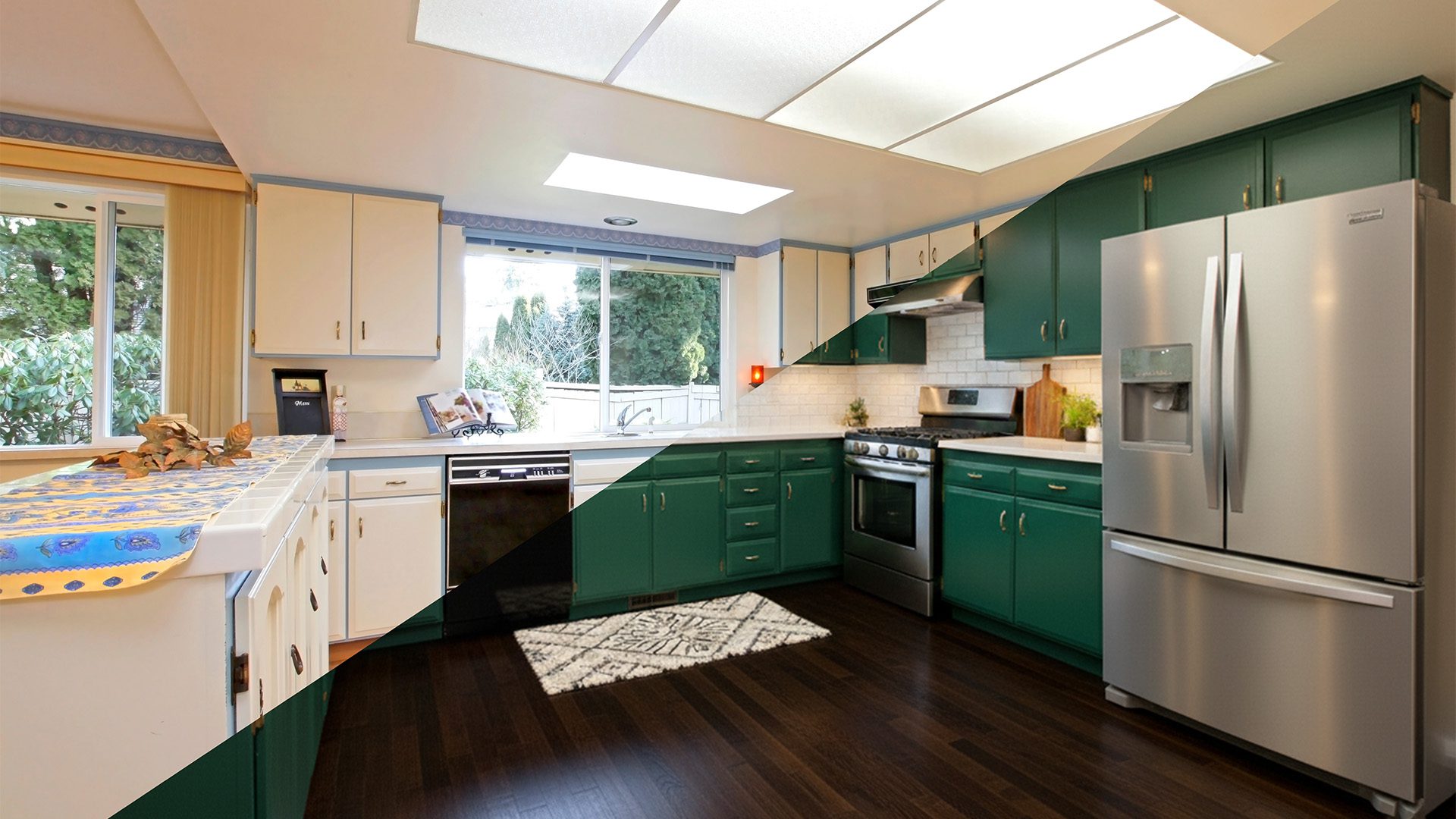Standing in your outdated kitchen, looking at those worn cabinets and chipped countertops, you’ve probably asked yourself the question every homeowner eventually faces: “What will this actually cost?”
If you’re like most homeowners in Metro Detroit, you’ve spent hours searching online for answers, only to find confusing national averages that don’t reflect Michigan’s market. You’ve seen estimates ranging from $10,000 to $150,000, leaving you more confused than when you started. And that uncomfortable feeling in your stomach? That’s the fear of getting halfway through a remodel and discovering you’ve drastically underbudgeted.
Bathroom remodel cost and kitchen renovation cost in Southeast Michigan run 5-15% below national averages, but successful projects require understanding far more than just average price tags. Between Michigan’s older housing stock, regional building codes, and 2026 material costs that look dramatically different from pre-pandemic pricing, you need accurate, localized information to budget realistically.
This comprehensive guide breaks down exactly what homeowners in Wayne, Oakland, Macomb, St. Clair, and Washtenaw counties should budget for kitchen and bathroom remodeling projects in 2026. We’ll cover real cost ranges for different project scopes, component-by-component breakdowns, hidden expenses that catch homeowners off guard, ROI data specific to Michigan markets, and practical strategies to maximize your investment while avoiding budget disasters.
💰 Quick Cost Overview: What to Expect in SE Michigan (2026)
Before diving into detailed breakdowns, here’s what you need to know upfront about remodeling costs 2026 in Southeast Michigan:
- Small Kitchen Remodel: $15,000-$35,000
- Full Kitchen Renovation: $35,000-$75,000
- High-End Kitchen Remodel: $75,000-$150,000+
- Small Bathroom Remodel: $8,000-$18,000
- Full Bathroom Renovation: $18,000-$35,000
- Master Bathroom Remodel: $35,000-$75,000+
These ranges reflect current Metro Detroit renovation costs including materials, labor, and permits. Projects in older homes (pre-1950s) should budget an additional 15-25% contingency for unexpected issues common in Michigan’s historic housing stock.
🏠 Understanding 2026 Remodeling Costs in Southeast Michigan
How Michigan’s Market Affects Your Project Budget
Southeast Michigan offers a unique advantage for homeowners planning a bathroom remodeling project or kitchen renovation – our regional costs run 5-15% below coastal markets while maintaining quality standards. This cost advantage stems from competitive labor markets and regional material pricing that favors Midwest homeowners.
However, SE Michigan remodeling costs involve factors that national calculators completely miss. Our older housing stock (many homes pre-date 1950) means higher likelihood of discovering outdated electrical systems, lead paint, or asbestos during demolition. Michigan building codes require specific upgrades when you pull permits, and seasonal weather affects both construction timelines and material delivery.
Labor rates in Metro Detroit align with national averages but offer better value. General contractors charge $45-75 per hour, plumbers average $26.49 per hour, and electricians run $25-45 per hour for standard work. Compare this to coastal markets where similar professionals command 30-50% premiums, and you’ll understand why many homeowners choose to invest in higher-quality materials rather than just accepting whatever fits a generic national budget.
Why 2026 Costs Look Different From Previous Years
The remodeling landscape has shifted dramatically since 2020. Material costs that once seemed stable now fluctuate quarterly, with suppliers implementing 3-6% price increases one to six times annually. What does this mean for your realistic budget? That online estimate you found from 2022 is likely 15-25% low for current market conditions.
Material lead times have increased 10-15% compared to 2023, requiring advance planning of 6-9 months for custom cabinetry. Stock cabinets need minimum three weeks, semi-custom average six weeks, and custom work requires 8-16 weeks. This extended timeline affects your overall remodeling project schedule and may influence which materials you select based on your move-in urgency.
Labor availability has tightened across Metro Detroit, particularly for skilled tradespeople familiar with Michigan’s specific code requirements. Quality contractors now require 6+ months advance booking for peak season work (spring through early fall), though winter projects offer 15-20% potential discounts along with better availability.
🍳 Kitchen Remodel Costs: Breaking Down Your Investment
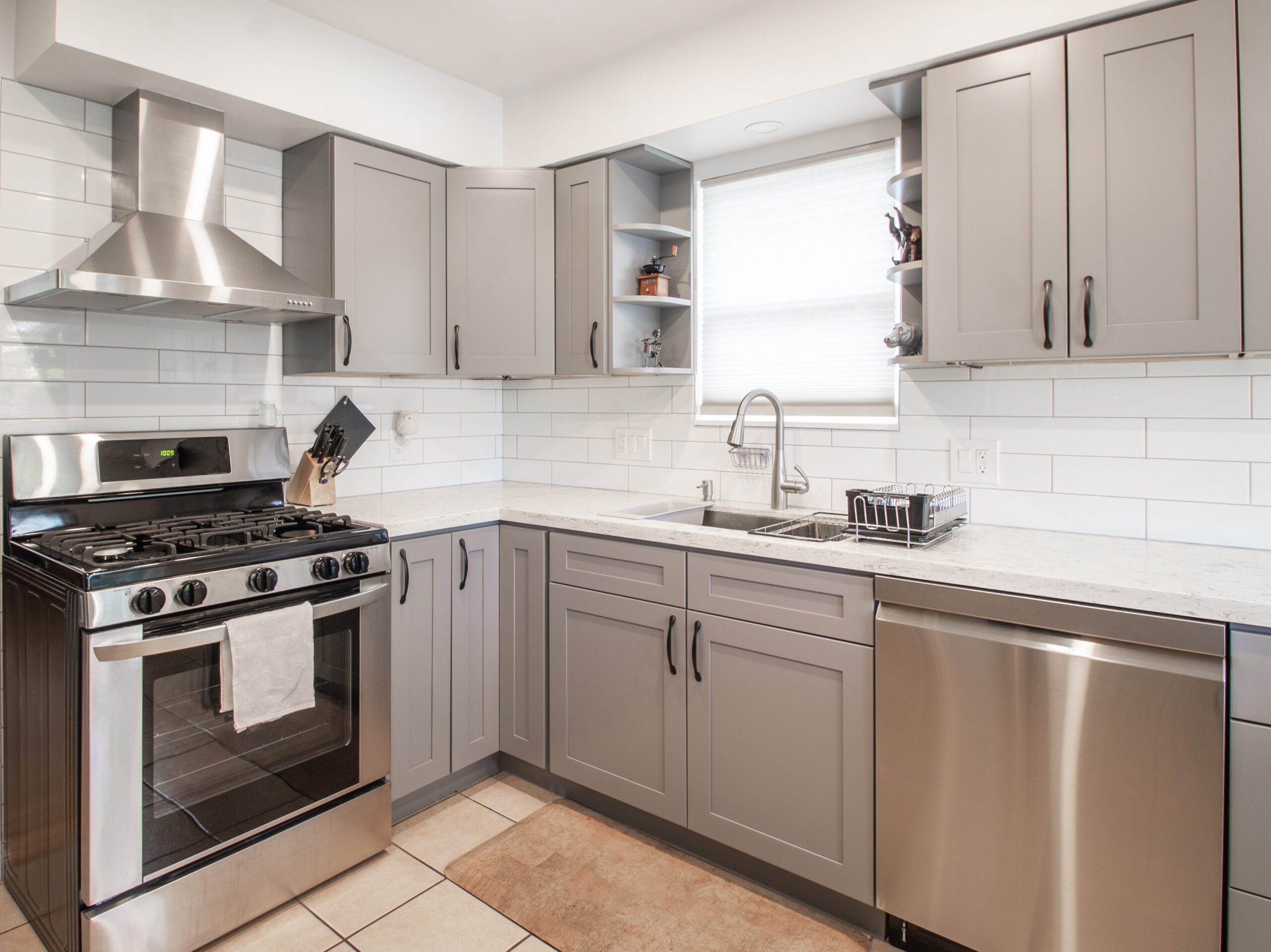
Small Kitchen Remodel Costs in Metro Detroit (Under 100 sq ft)
If you’re working with a compact kitchen and want to maximize impact without completely gutting the space, a small kitchen remodel typically costs $15,000-$35,000 in Southeast Michigan. This range covers cosmetic updates that transform appearance while keeping your existing layout intact.
What’s included in a small kitchen remodel? You’re looking at cabinet refacing or painting, new countertops, updated backsplash, new sink and faucet, fresh lighting fixtures, and possibly new flooring. The key distinction here is that you’re not moving plumbing or electrical – you’re working within the existing footprint to refresh materials and finishes.
Cabinet refacing emerges as the most impactful cost-saving decision for small kitchens. At $4,500-$13,000 versus $15,000-$50,000 for full replacement, you’re saving 30-50% while achieving a completely transformed look. The process takes just 3-5 days and replaces doors, drawer fronts, and veneers while updating hardware. This makes sense when your cabinet boxes remain structurally sound and your layout works well for your needs.
For budget-conscious homeowners, focusing updates on highly visible elements delivers maximum impact. New countertops dramatically change your kitchen’s appearance – laminate options start at $20-50 per square foot installed, while quartz runs $50-150 per square foot. Pair updated countertops with a modern tile backsplash ($15-30 per square foot installed), and you’ve transformed the entire visual aesthetic for a fraction of full renovation costs.
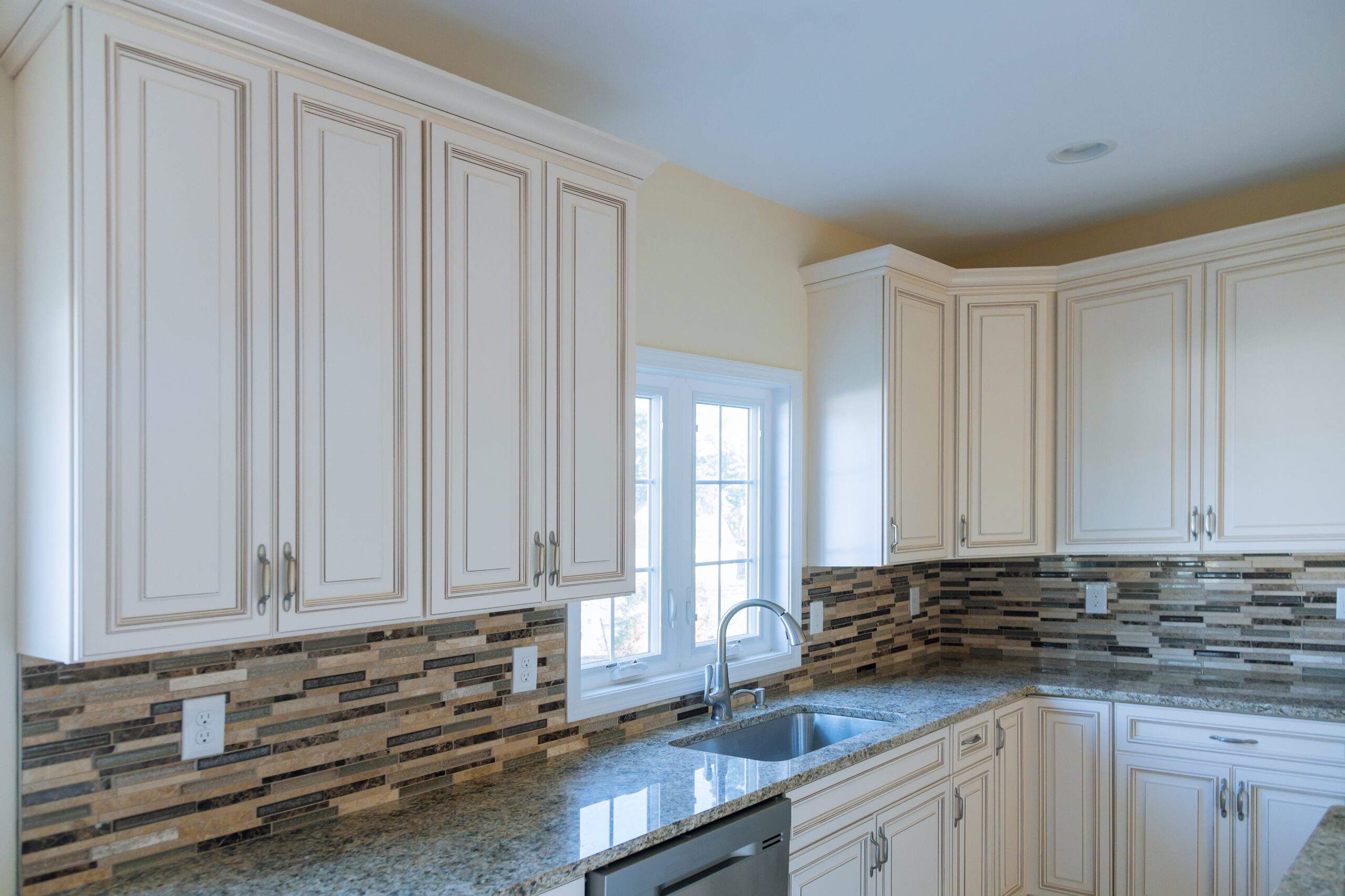
Average Kitchen Remodel Cost: Full Renovation (100-200 sq ft)
A full kitchen renovation represents the sweet spot for most Metro Detroit homeowners, typically ranging $35,000-$75,000 for mid-range projects. This comprehensive overhaul replaces everything – cabinets, countertops, appliances, flooring, lighting, and often includes layout modifications that improve functionality.
Understanding where your budget goes helps you make strategic decisions. Here’s the typical remodeling cost breakdown for full kitchen renovations:
- Cabinets: 30-40% ($10,500-$30,000) – Your single largest expense
- Labor Costs: 20-35% ($7,000-$26,250) – Installation, electrical, plumbing
- Appliances: 15-20% ($5,250-$15,000) – Range, refrigerator, dishwasher, microwave
- Countertops: 10-15% ($3,500-$11,250) – Material and installation
- Flooring: 7-10% ($2,450-$7,500) – Depends heavily on material choice
- Lighting: 5-8% ($1,750-$6,000) – Fixtures, under-cabinet, ambient
- Backsplash: 3-5% ($1,050-$3,750) – Tile material and installation
The single biggest cost-saving decision for full renovations? Keeping your existing layout. Moving plumbing and electrical adds $2,000-$10,000+ to your project budget, and often doesn’t deliver proportional value unless your current layout genuinely doesn’t function for your needs.
Many homeowners in Oakland County and other Metro Detroit areas choose to invest their savings from layout preservation into higher-quality cabinets or countertops – upgrades you’ll appreciate daily for decades rather than a slightly different sink location you’ll forget about within months.
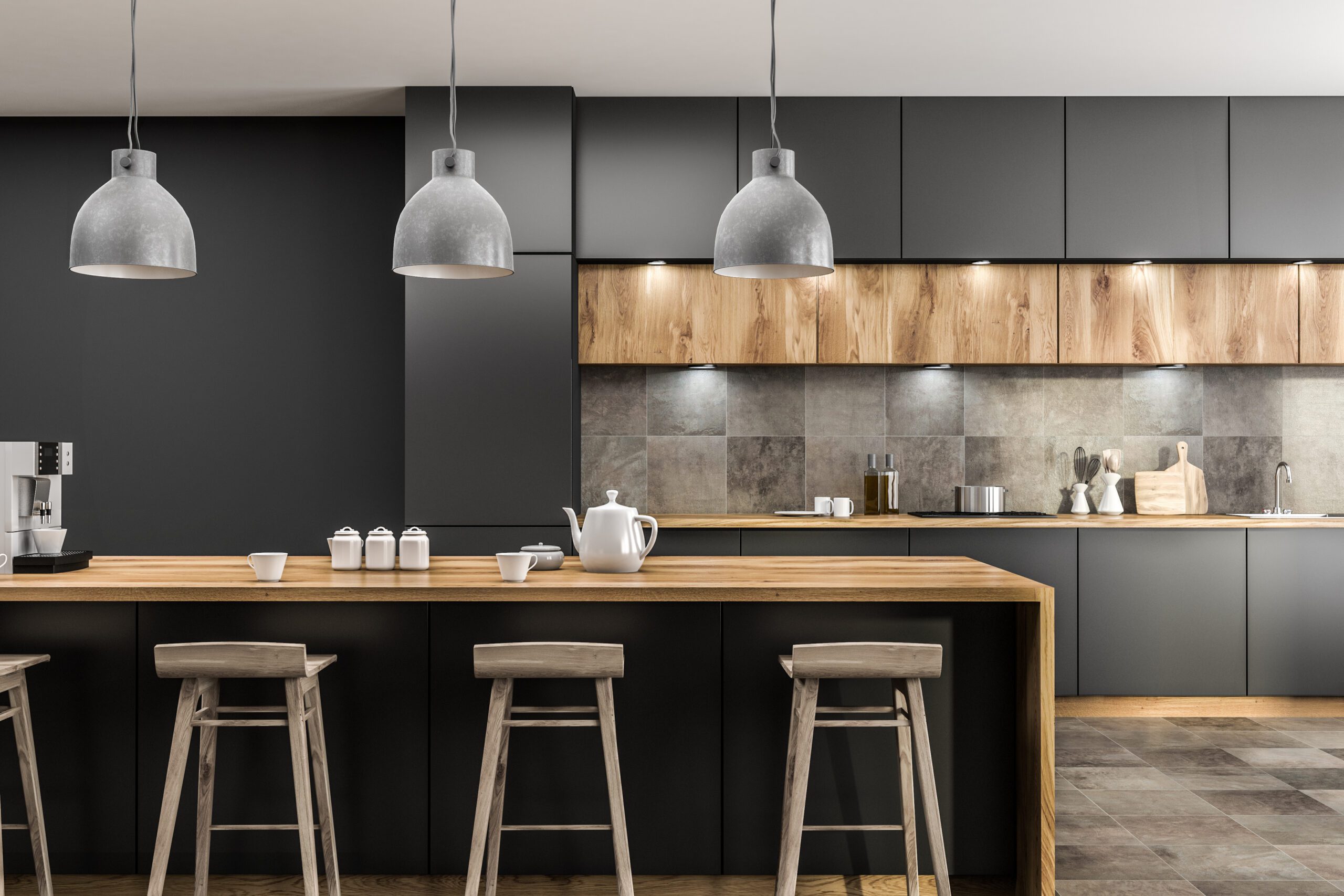
High-End Kitchen Remodel: Luxury Investment ($75,000-$150,000+)
Luxury kitchen renovations in Troy, Birmingham, and other upscale Metro Detroit communities regularly exceed $75,000, with many projects reaching $150,000 or more. What distinguishes these high-end remodels from mid-range work?
Custom cabinetry represents the primary differentiator, with fully custom work running $500-$1,200 per linear foot versus semi-custom at $150-700 per linear foot. A typical 20-foot kitchen could see cabinet costs alone range from $10,000 for stock options to $24,000+ for custom work. These custom cabinets offer precise sizing for your space, unlimited finish options, specialized storage solutions, and craftsmanship details like dovetail joints and soft-close mechanisms.
Premium countertops push budgets higher quickly. While quartz averages $50-150 per square foot, exotic materials like Calacatta marble run $75-250 per square foot, and quartzite spans $60-150 per square foot. Professional-grade appliances – think Wolf ranges, Sub-Zero refrigerators, and Miele dishwashers – add $15,000-$40,000 versus $5,000-$10,000 for quality mid-range brands.
High-end projects often include layout modifications that require structural changes: removing walls for open concepts, adding or expanding islands, installing statement range hoods requiring custom ductwork, or creating butler’s pantries and walk-in pantries. These architectural modifications add both cost and complexity but can genuinely transform how your kitchen functions for entertaining and daily life.
Kitchen Component Cost Details: Where Your Money Goes
Cabinet Options and Pricing
Since cabinets consume 30-40% of your kitchen remodel budget, understanding your options helps you make strategic decisions:
- Stock Cabinets: $100-400 per linear foot – Pre-manufactured in standard sizes, limited color options, fastest availability (3+ weeks)
- Semi-Custom Cabinets: $150-700 per linear foot – Customizable dimensions, wider finish selection, moderate lead times (6 weeks average)
- Custom Cabinets: $500-$1,200+ per linear foot – Built specifically for your space, unlimited options, longest lead times (8-16 weeks)
For a typical Metro Detroit kitchen requiring 20-25 linear feet of cabinets, you’re looking at $6,000-$30,000 depending on your choice. The quality difference between stock and custom isn’t just aesthetic – custom cabinets offer superior construction, better hardware, and specialized storage solutions that improve daily functionality.
Countertop Comparison: Materials and Costs
Countertops dramatically impact both appearance and your budget. Here’s what to expect per square foot installed in Southeast Michigan:
- Laminate: $20-50 – Most budget-friendly, improving quality and patterns
- Solid Surface: $40-80 – Seamless appearance, repairable scratches
- Granite: $40-200 – Natural stone, unique patterns, requires sealing
- Quartz: $50-150 – Engineered stone, low maintenance, consistent patterns
- Marble: $75-250 – Luxury appearance, requires careful maintenance
- Quartzite: $60-150 – Extremely durable, natural stone beauty
A typical kitchen requires 50-75 square feet of countertop area, meaning your material choice swings total cost from $1,000 for laminate to $18,750 for high-end marble. For most Metro Detroit homeowners, quartz offers the best balance of durability, appearance, and maintenance requirements at mid-range pricing.
Appliance Investment: Budget to Luxury
Appliances account for 15-20% of full kitchen renovation costs, typically $5,250-$15,000 for quality mid-range packages. Your primary appliances break down as:
- Refrigerator: $800-$3,000 (standard) to $5,000-$15,000 (built-in, pro-style)
- Range or Cooktop + Oven: $600-$2,500 (standard) to $3,000-$10,000 (professional)
- Dishwasher: $400-$1,200 (standard) to $1,500-$3,000 (premium quiet models)
- Microwave: $200-$600 (countertop) to $400-$2,000 (built-in)
- Range Hood: $200-$1,000 (standard) to $1,500-$5,000 (professional)
Energy-efficient appliances with ENERGY STAR certification use 20-50% less energy than standard models and save typical households $450-576 annually on utility bills. With current tax credits offering up to $2,000 for qualifying heat pump technology and $1,200 annually for efficient appliances through end of 2025, these upgrades often pay for themselves within 5-8 years.
Flooring Materials and Installation Costs
Kitchen flooring spans a wide range of materials and price points:
- Luxury Vinyl Plank (LVP): $3-8 per square foot installed – Water-resistant, comfortable underfoot, realistic wood appearance
- Ceramic Tile: $5-15 per square foot installed – Durable, water-resistant, cooler surface
- Porcelain Tile: $8-20 per square foot installed – More durable than ceramic, better for high-traffic
- Hardwood: $8-25 per square foot installed – Classic appearance, requires careful moisture management
- Natural Stone: $10-30 per square foot installed – Luxury feel, requires sealing and maintenance
A 150 square foot kitchen needs $450-$4,500 in new flooring depending on material choice. Many Metro Detroit homeowners choose LVP for its combination of water resistance (critical near sinks), comfort, and realistic appearance at budget-friendly pricing.
🚿 Bathroom Remodel Costs: What to Expect in SE Michigan
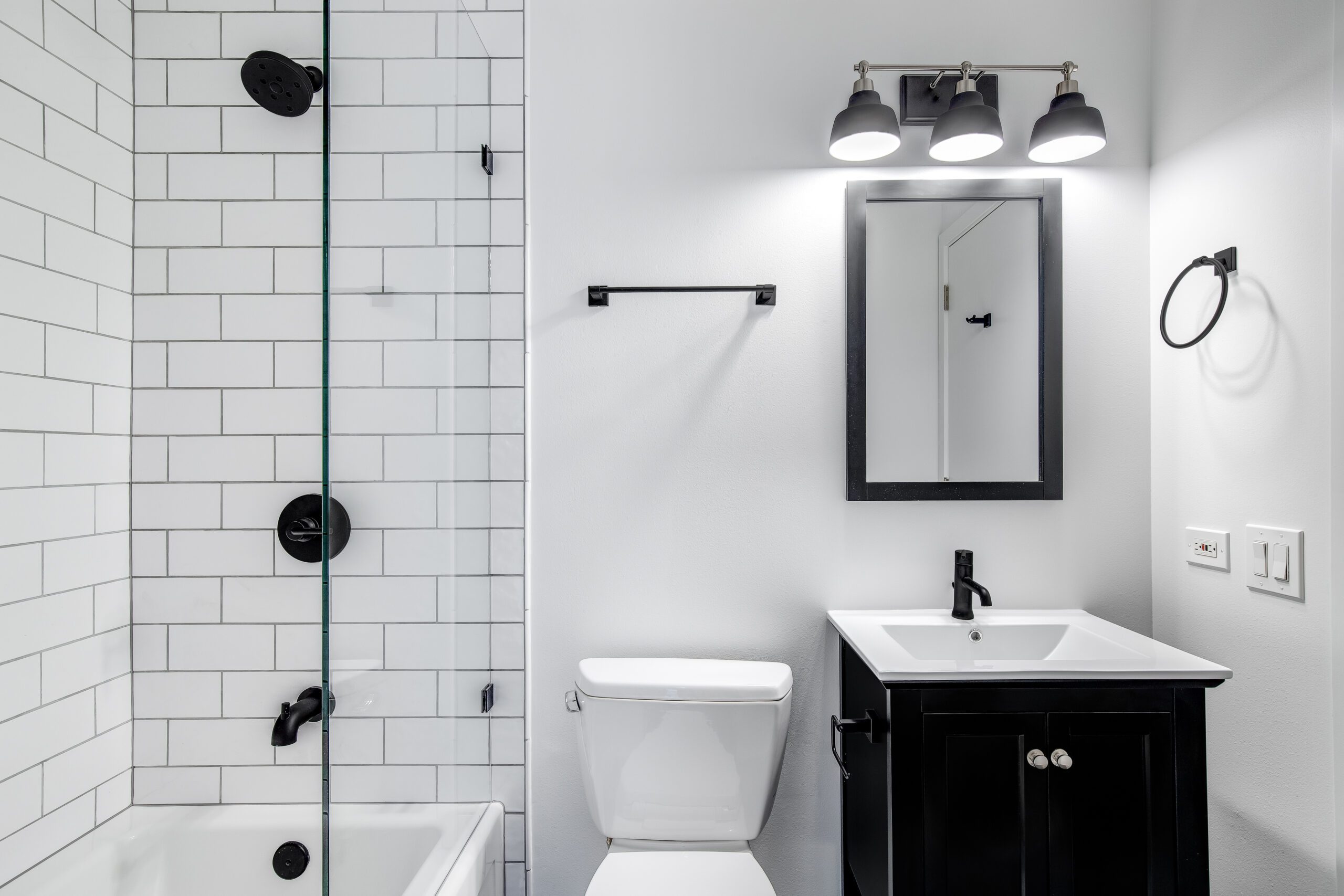
Small Bathroom Remodel Cost (Under 50 sq ft)
Guest bathrooms and powder rooms under 50 square feet typically cost $8,000-$18,000 for full renovations in Southeast Michigan. These compact spaces offer opportunities for impactful updates without the expense of larger primary bathrooms.
A basic small bathroom refresh ($8,000-$12,000) includes new vanity and sink, toilet replacement, updated lighting fixtures, fresh paint, and new accessories like towel bars and towel racks. You’re keeping the existing tub or shower, maintaining the current layout, and focusing on cosmetic improvements that make the space feel fresh and modern.
A comprehensive small bathroom remodel ($12,000-$18,000) adds significant tile work – new floor tile and potentially tub/shower surround replacement – along with updated plumbing fixtures, improved ventilation fan, and possibly a tub-to-shower conversion. This level of work transforms not just appearance but functionality, addressing issues like poor ventilation or outdated fixtures that waste water and energy.
The average bathroom remodel cost for guest bathrooms in Macomb County and other Metro Detroit areas runs $10,000-$15,000, delivering solid return on investment while improving daily function for family and guests.
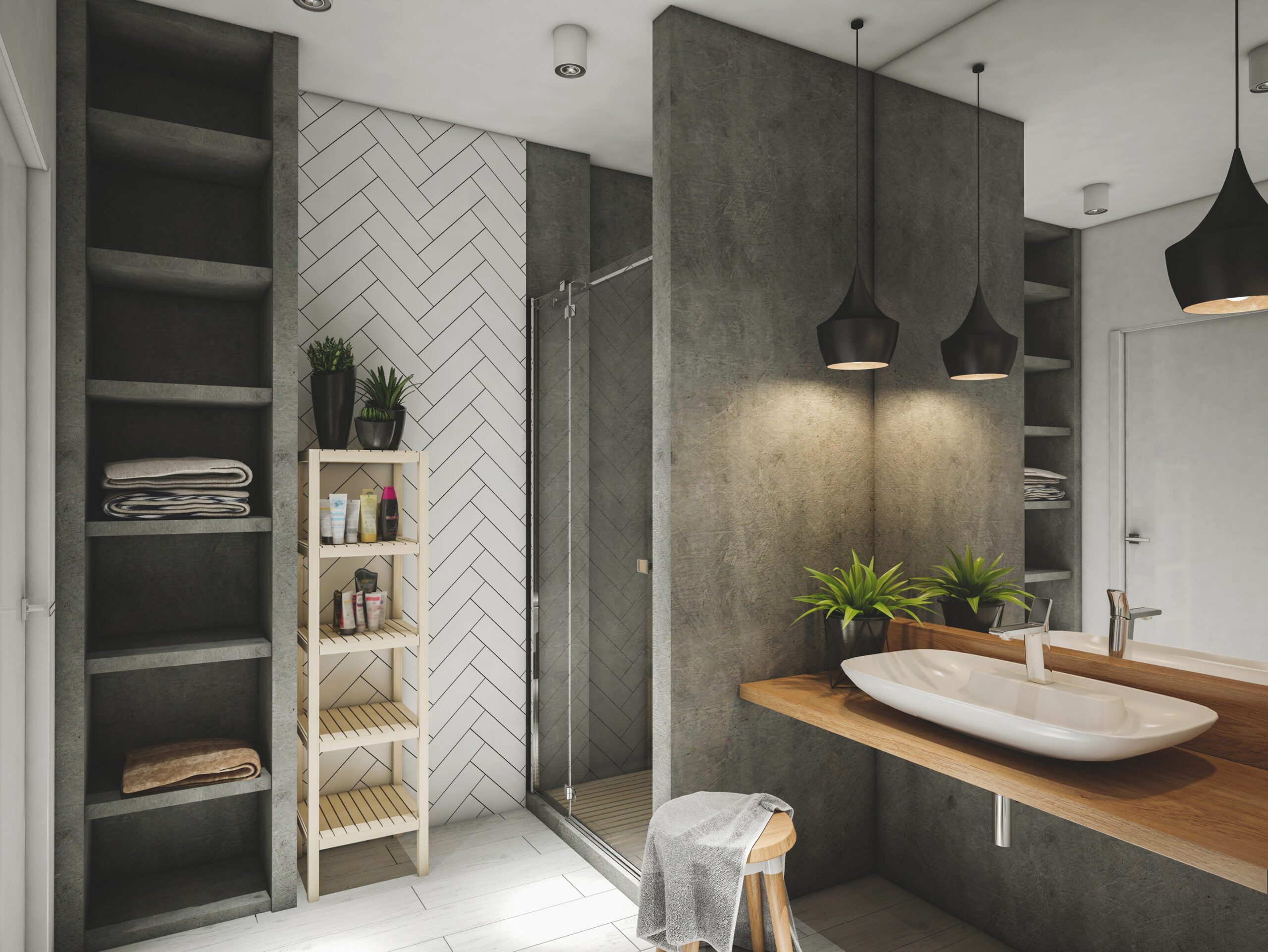
Full Bathroom Renovation Cost (50-100 sq ft)
Standard full bathrooms serving as family bathrooms typically cost $18,000-$35,000 for complete renovations in Southeast Michigan. This scope includes replacing all fixtures, complete tile work, new vanity and countertops, updated lighting, proper ventilation, and often minor layout adjustments.
Understanding the bathroom renovation cost breakdown helps you budget appropriately:
- Labor Costs: 30-40% ($5,400-$14,000) – Installation, plumbing, electrical, tile work
- Fixtures: 20-30% ($3,600-$10,500) – Tub or shower, toilet, vanity, faucets
- Tile and Flooring: 15-20% ($2,700-$7,000) – Floor tile, shower tile, installation
- Vanity and Countertops: 15-20% ($2,700-$7,000) – Cabinet, sink, countertop material
- Plumbing and Electrical: 10-15% ($1,800-$5,250) – Rough-in, fixtures, ventilation
- Miscellaneous: 5-10% ($900-$3,500) – Lighting, accessories, permits, disposal
Labor dominates bathroom project budgets more than kitchen work, consuming 40-65% of total costs when you factor in specialized tile installation ($30-120 per hour) and plumbing work ($45-200 per hour) that requires licensed professionals in Michigan.
The most popular upgrade in full bathroom remodels? Walk-in or curbless showers with low-threshold or zero-threshold entries. These serve both accessibility needs and modern aesthetics while offering easier cleaning than traditional tub/shower combinations. Expect to invest $6,000-$12,000 for quality walk-in shower installation including tile work, glass enclosure, and fixtures.
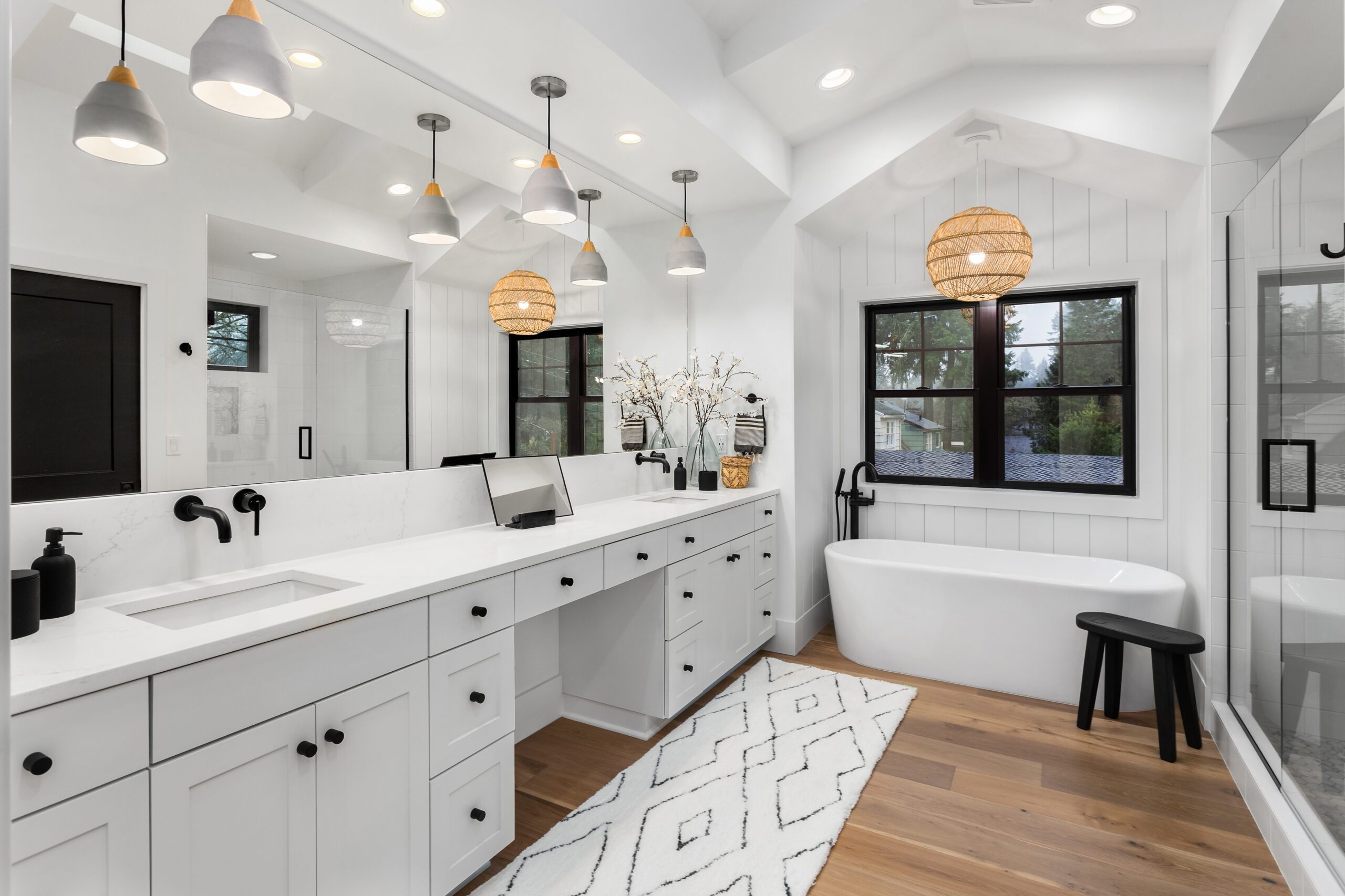
Master Bathroom Remodel Cost: Primary Suite Luxury
Primary bathroom renovations in Rochester Hills, Troy, and other upscale Metro Detroit communities typically range $35,000-$75,000+ for luxury installations that transform these spaces into spa-like retreats.
What distinguishes master bathroom remodels from standard bathrooms? Scale and luxury features drive costs higher. Double-sink vanities with custom cabinetry and premium countertops replace single sinks. Separate shower and soaking tub installations provide spa functionality. Heated floors, towel warmers, upgraded ventilation systems, and enhanced lighting create resort-level comfort.
High-end primary bathrooms often include:
- Custom Tile Work: $8,000-$15,000 – Floor-to-ceiling tile, decorative accents, premium materials
- Luxury Shower System: $8,000-$20,000 – Multiple shower heads, rainfall fixtures, body jets, steam capability
- Freestanding Soaking Tub: $2,000-$7,000+ – Statement piece with floor-mounted filler
- Custom Double Vanity: $5,000-$15,000 – Furniture-quality cabinetry, premium countertops
- Heated Flooring: $1,500-$3,000 – Radiant heating throughout
- Smart Features: $2,000-$8,000 – Digital shower controls, smart mirrors, automated lighting
While these luxury features push budgets significantly higher, they also deliver daily enjoyment that justifies investment for homeowners planning to stay in their homes long-term. The key is balancing personal enjoyment with resale considerations – over-improving beyond your neighborhood’s standard can limit ROI when you eventually sell.
Bathroom Component Cost Details
Vanity and Countertop Investment
Your vanity serves as both functional storage and visual centerpiece, with costs varying dramatically by quality and customization:
- Stock Vanities: $200-$1,000 – Pre-manufactured, standard sizes, basic finishes
- Semi-Custom Vanities: $800-$3,000 – More size options, better finishes, improved construction
- Custom Vanities: $1,500-$5,000+ – Built for your space, unlimited finish options, furniture-quality
Vanity countertops follow similar pricing to kitchen countertops but require less square footage, typically $200-$1,500 depending on material. Many Metro Detroit homeowners choose quartz for bathroom countertops due to its non-porous surface that resists moisture and staining without requiring sealing.
Shower and Tub Options
Your shower or tub represents a major bathroom investment:
- Standard Tub: $400-$1,500 installed – Alcove design, acrylic or fiberglass
- Walk-In Shower: $6,000-$12,000 installed – Custom tile, glass enclosure, quality fixtures
- Tub-to-Shower Conversion: $3,000-$8,000 – Remove old tub, install new shower base, surround, fixtures
- Freestanding Soaking Tub: $2,000-$7,000+ – Statement piece, floor-mounted filler, installation
- Luxury Shower System: $8,000-$20,000+ – Multiple heads, steam, body jets, digital controls
Tub-to-shower conversions have become increasingly popular in Metro Detroit as homeowners prioritize accessibility and modern functionality over rarely-used bathtubs. This conversion opens up space, improves accessibility, and often includes upgraded tile and fixtures that transform the entire bathroom appearance.
Tile Work: Walls and Floors
Tile installation represents a major bathroom expense, with costs varying by material complexity and installation difficulty:
- Ceramic Tile: $7-15 per square foot installed – Budget-friendly, wide color selection
- Porcelain Tile: $10-25 per square foot installed – More durable than ceramic, better for wet areas
- Natural Stone: $15-50 per square foot installed – Unique patterns, requires sealing
- Glass Tile: $25-100 per square foot installed – Accent use, light-reflective
A standard full bathroom requiring 100 square feet of floor tile and 200 square feet of shower/tub surround tile involves $2,800-$7,500 in tile costs alone at mid-range pricing. Large-format tiles (18×18 inches and larger) have become increasingly popular, creating fewer grout lines for easier cleaning and more contemporary appearance.
💡 Budget-Friendly Remodeling Strategies That Actually Work
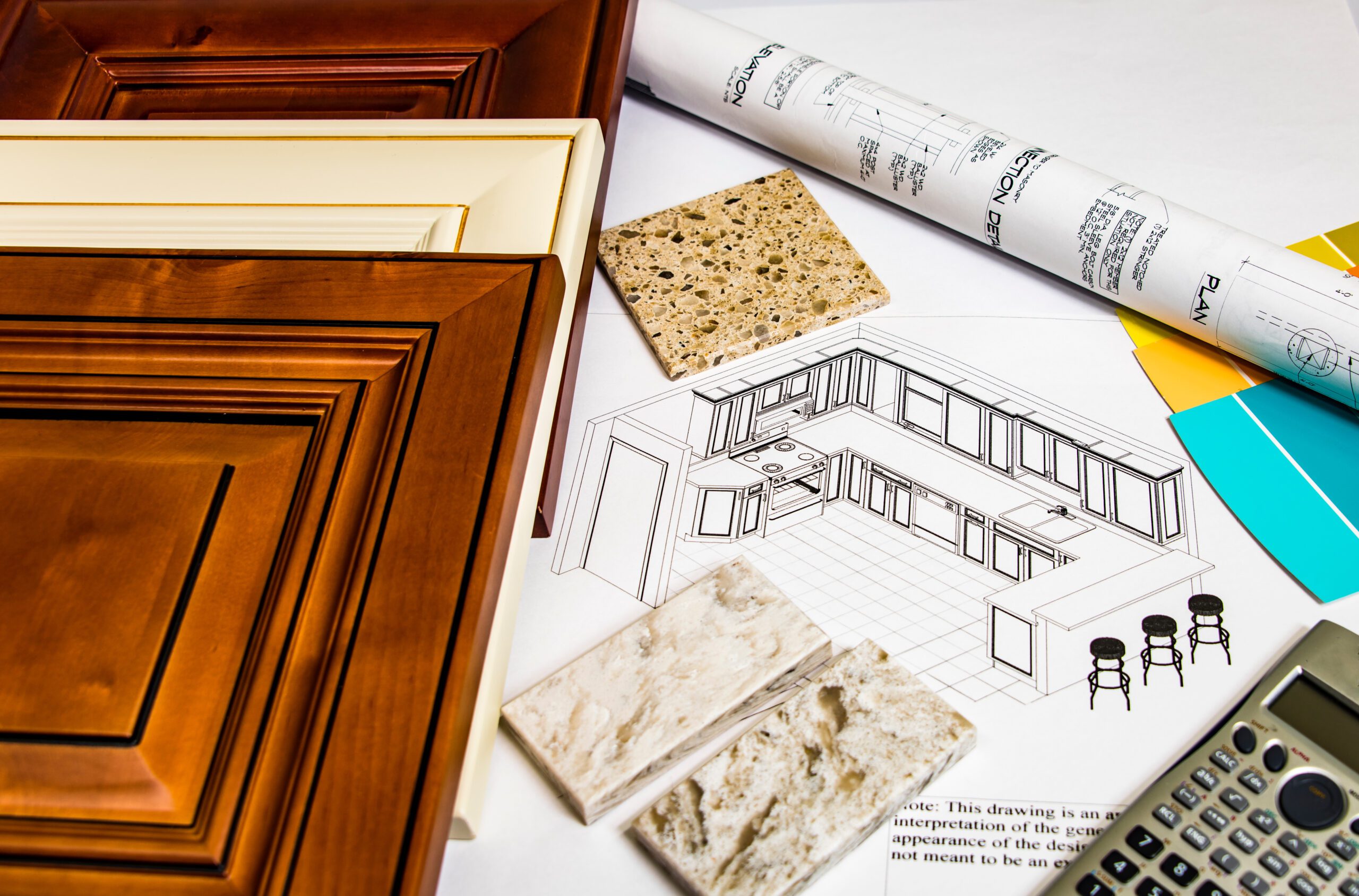
Kitchen Renovation on a Budget: High-Impact Updates
Not every kitchen needs a complete gut renovation. Strategic updates focusing on high-visibility elements can transform your space for $15,000-$25,000 instead of $50,000+. Here’s where to focus for maximum impact:
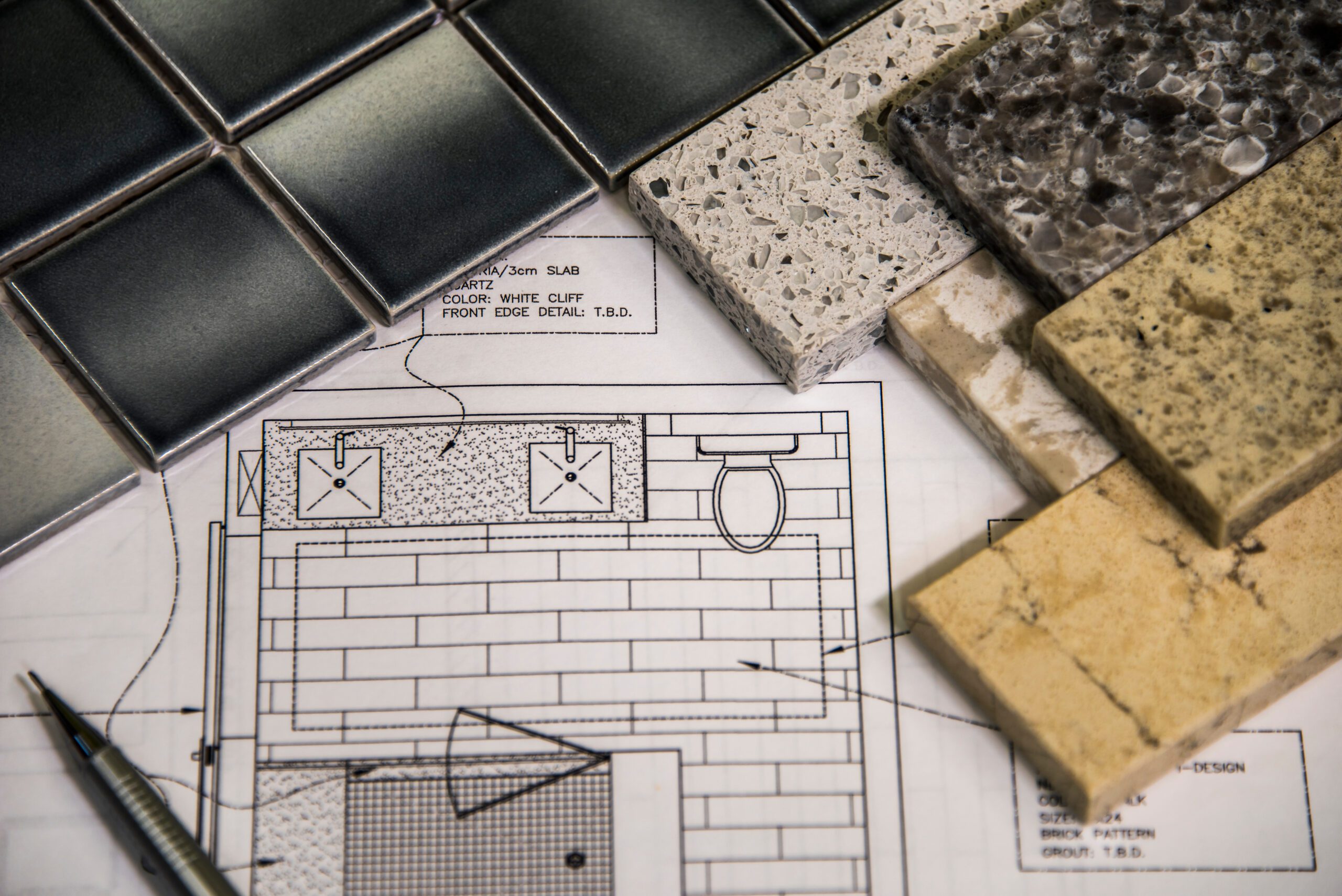
Budget Bathroom Remodel: Smart Cost-Cutting
Bathroom makeovers don’t require $25,000 investments to achieve impressive results. Focus your budget on these high-impact areas:
Kitchen and Bathroom Remodel Together: Package Savings
One often-overlooked strategy: tackling kitchen and bathroom remodel together can save 10-15% on total project costs through several mechanisms.
First, contractors often discount bundled work since they’re already mobilized at your property. Instead of separate trips for materials, permits, and inspections, they complete everything in one extended project. This saves their time and overhead, savings they can pass to you.
Second, material ordering becomes more efficient. Ordering flooring, tile, paint, and fixtures for multiple spaces at once often unlocks volume discounts or reduces delivery fees. That $500-$1,000 delivery charge gets spread across more materials, lowering per-square-foot costs.
Third, permit fees and inspection costs get consolidated. Instead of paying $300-$700 for kitchen permits and another $300-$700 for bathroom permits separately, combined projects often reduce total permitting costs through consolidated applications.
The main challenge with combined projects? Living through more extensive disruption. Kitchen and bathroom renovations together mean reduced functionality in two critical spaces simultaneously. However, for homeowners with flexible living situations or those buying/renovating before moving in, the 10-15% savings (potentially $5,000-$12,000 on a $50,000-$80,000 combined project) justifies the temporary inconvenience.
📊 Cost vs. Value: Understanding Your ROI in Michigan
2024-2025 Remodeling ROI Data for Michigan Homeowners
Understanding kitchen remodel ROI and bathroom renovation return on investment helps you make strategic decisions about which projects to tackle and how much to invest. The 2024 Cost vs. Value Report provides crucial insights for Metro Detroit homeowners:
Kitchen Remodeling ROI:
- Minor Kitchen Remodel: 72-96% ROI – Average cost $25,000-$27,492, recoups $20,000-$26,406
- Midrange Kitchen Remodel: 41.8-60% ROI – Average cost $84,680, regional variations significant
- Major Kitchen Remodel: 37.5-53% ROI – High-end projects see lower percentage returns
Bathroom Remodeling ROI:
- Midrange Bathroom Remodel: 66.7-80% ROI – Average cost $24,606-$25,251
- Upscale Bathroom Remodel: 49-54.8% ROI – Luxury features recoup less percentage
- Accessible Bathroom Remodel: 49% ROI – Aging-in-place modifications retain value
The data reveals a crucial pattern: mid-range updates consistently outperform luxury renovations for ROI. A $25,000 minor kitchen remodel returning 96% delivers better financial results than a $150,000 luxury remodel returning 40%, even though the luxury version creates a more impressive space.
Detroit and Midwest markets often outperform national averages for practical, mid-range projects. Regional data shows 78% returns on kitchen remodels versus 72% nationally, and similar advantages for bathroom work. Michigan’s older housing stock makes updated kitchens and bathrooms particularly valuable – homes with recently renovated bathrooms sell 23% faster, and 94% of real estate agents believe modernized kitchens and bathrooms significantly increase buyer appeal.
What Metro Detroit Buyers Actually Want
Understanding buyer preferences in Southeast Michigan helps you focus investments where they’ll deliver resale value:
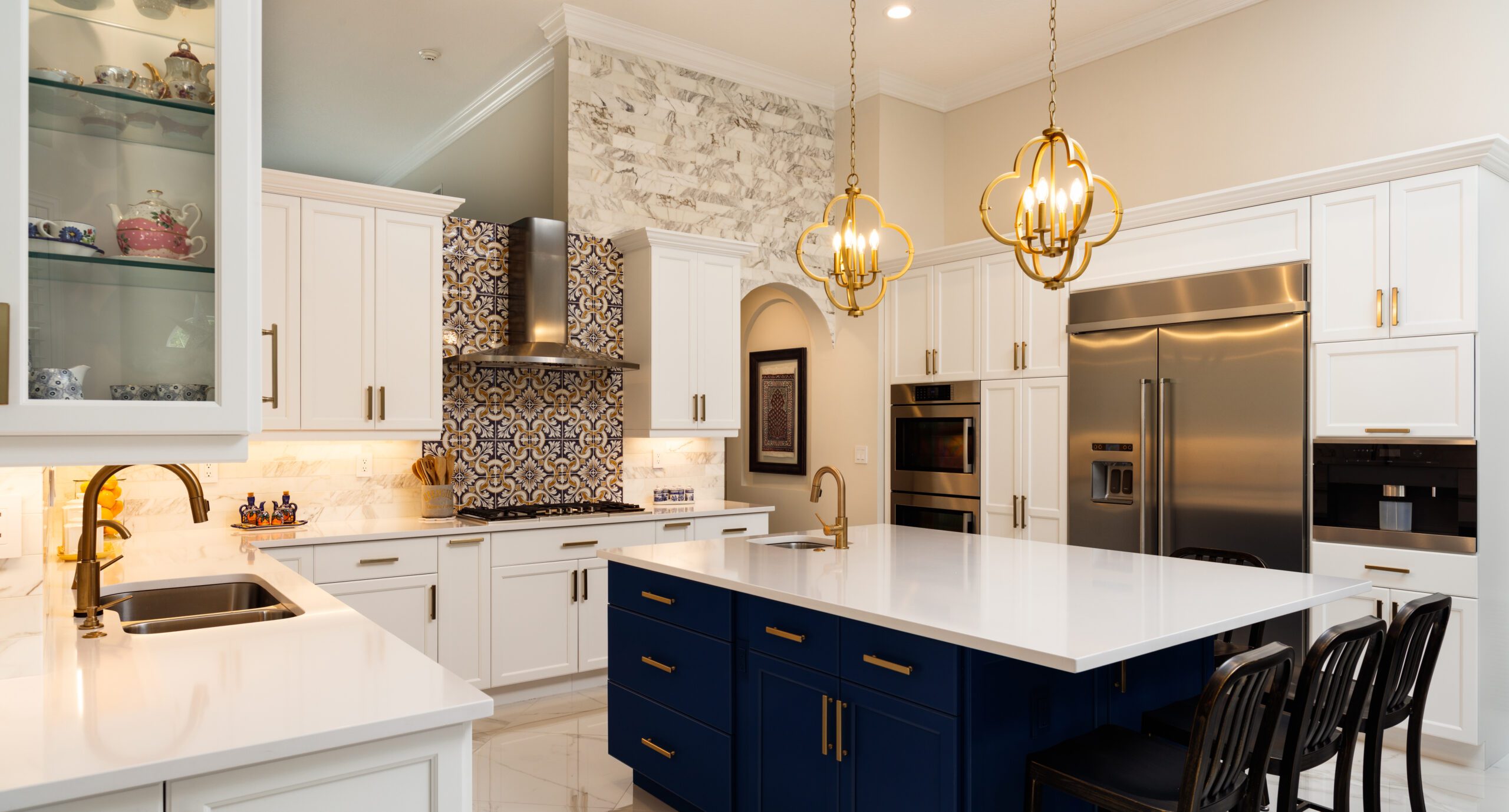
Kitchen Features Buyers Value:
- Open-concept layouts connecting to living areas
- Quartz or granite countertops (not laminate, but also not exotic marble)
- Updated energy-efficient appliances in stainless steel or panel-ready
- Ample storage with modern cabinetry
- Kitchen islands for seating and workspace
- Good lighting including task and ambient sources
- Neutral finishes that appeal to wide buyer range
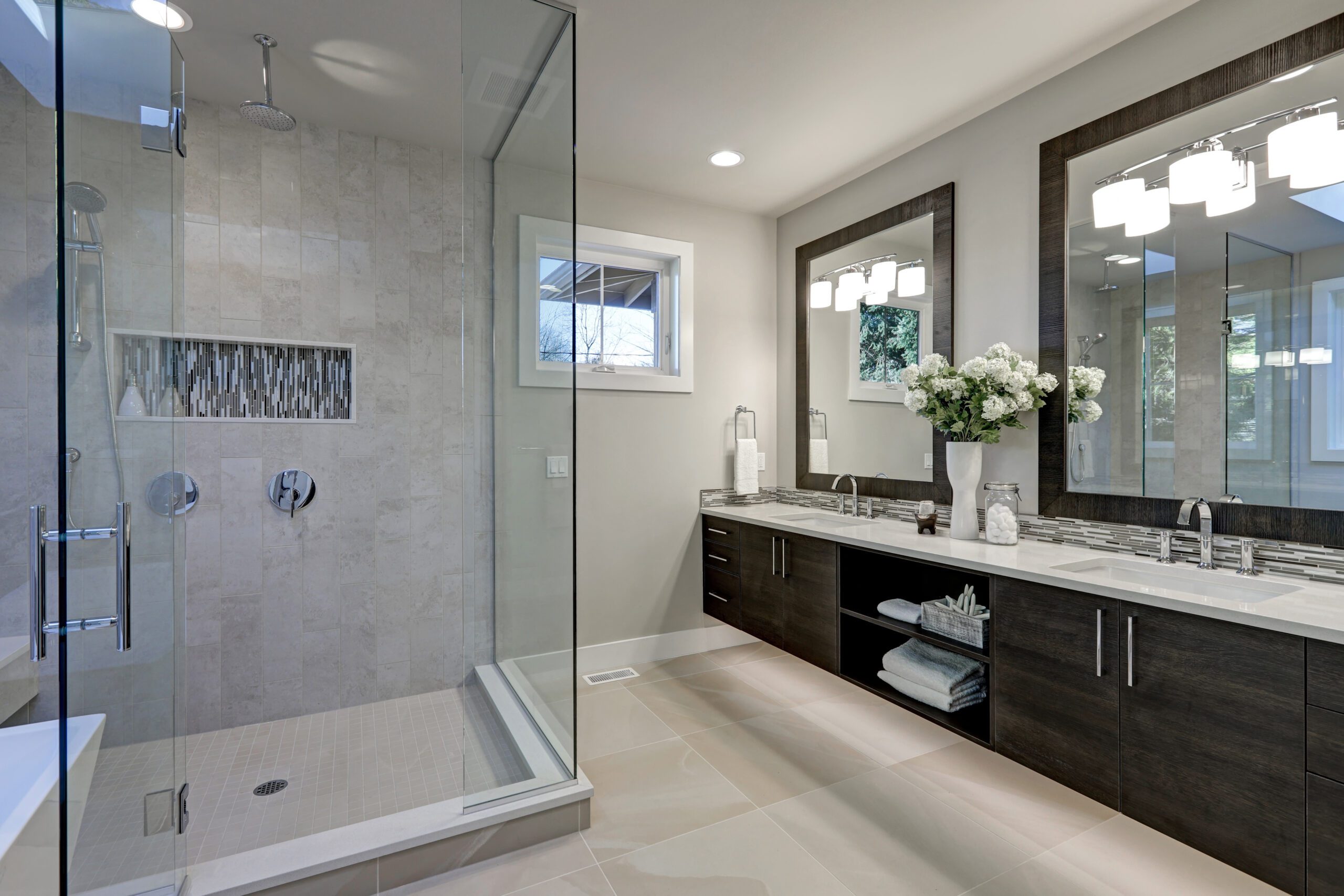
Bathroom Features That Boost Value:
- Walk-in or curbless showers (accessibility sells)
- Double-sink vanities in primary bathrooms
- Quality tile work throughout
- Modern fixtures including low-flow toilets and water-saving faucets
- Adequate storage and counter space
- Proper ventilation preventing moisture issues
- Neutral color schemes
- Heated floors (particularly valued in Michigan winters)
Over-improving beyond your neighborhood’s standards rarely delivers ROI. If surrounding homes in your St. Clair Shores neighborhood typically have $35,000-$50,000 kitchens, investing $150,000 in yours won’t recoup the premium when you sell. Buyers shopping your price point have different expectations than those looking at homes $100,000+ above your market.
Remodeling for Lifestyle vs. Resale
ROI calculations shouldn’t dictate every decision. If you’re planning to stay in your home 10+ years, your personal enjoyment matters more than resale percentages. That luxury soaking tub you’ll use weekly for a decade justifies investment even if it only recoups 50% at resale, because you’re buying daily quality of life, not just financial return.
However, even lifestyle-focused remodels benefit from avoiding choices that actively harm resale value. Examples of poor resale decisions include extremely bold or trendy colors that limit buyer appeal, removing bedroom or bathroom count that drops your home’s functionality, overly personalized designs that only work for specific tastes, and cutting corners on quality that creates maintenance issues future buyers will discover.
The sweet spot? Invest in quality materials and professional installation for durability, choose timeless designs with personal touches through accessories, prioritize functionality improvements that everyone appreciates, and reserve bold personal statements for easily-changed elements like paint colors and light fixtures rather than permanent installations.
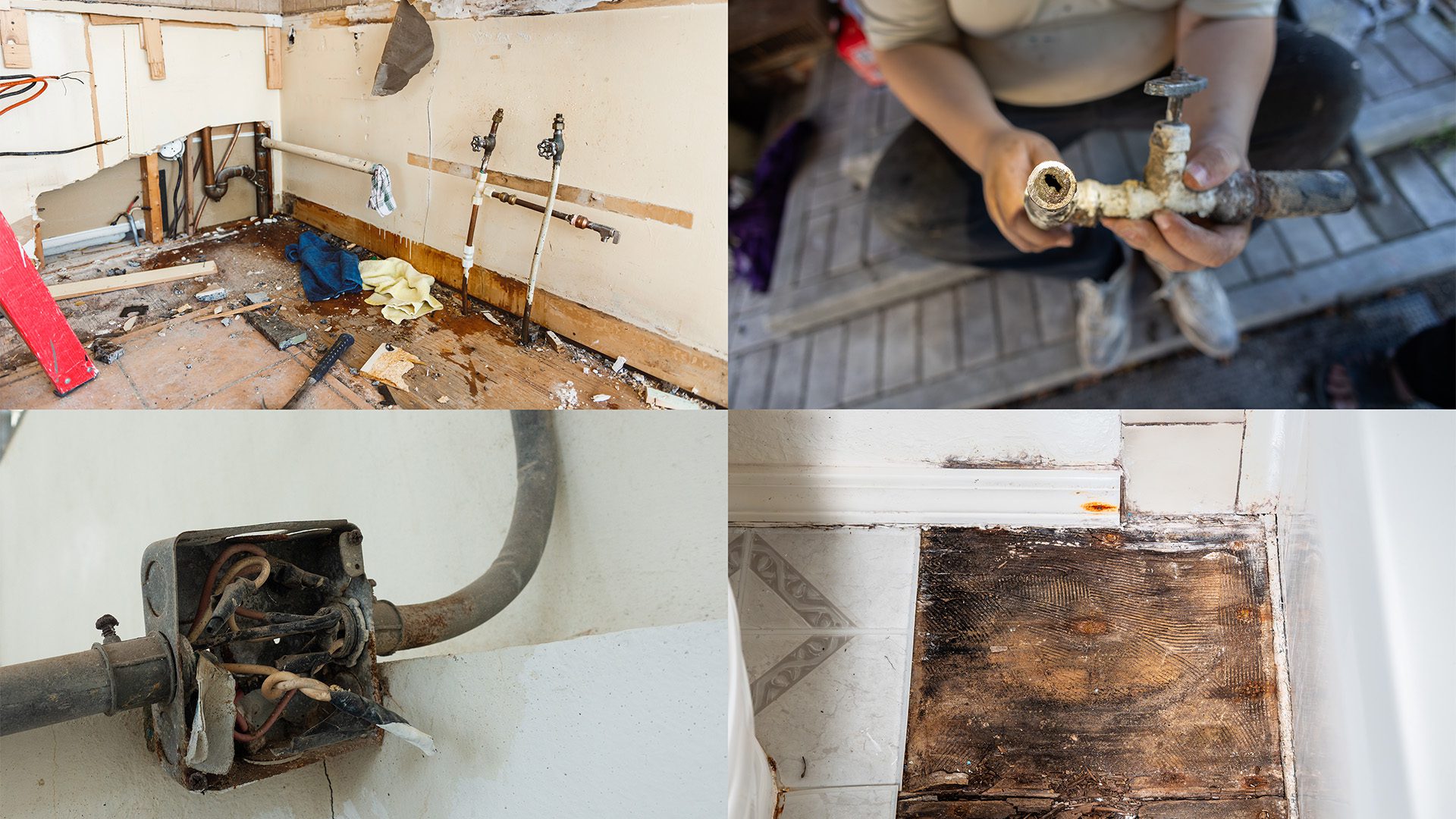
🚨 Hidden Costs and Budget Surprises Every Michigan Homeowner Should Know
What Your Initial Estimate Might Miss
Even the most detailed estimates can’t predict everything hiding behind your walls. Michigan’s older housing stock – much of Metro Detroit was built pre-1950 – means higher likelihood of discovering expensive surprises during demolition.
Michigan-Specific Cost Factors You Can’t Ignore
Permit Costs Across Metro Detroit
Permit requirements and costs vary significantly across Southeast Michigan municipalities. Here’s what to expect:
- Detroit: $200-$1,000 for kitchen/bathroom electrical and plumbing modifications, with historic districts requiring additional Historic District Commission review adding 2-4 weeks
- Troy: $400-$800 typical for full kitchen/bathroom remodels
- St. Clair Shores: $300-$600 for permits, 1-2 week processing
- Sterling Heights: $350-$700 depending on scope
- Warren: $300-$650 for residential remodeling permits
Processing timelines typically take 1-4 weeks, extending to a month during peak spring and summer construction seasons when building departments see highest volume. Urban areas with older housing and historic districts involve more stringent review, potentially adding weeks to timelines even after paying higher permit fees.
Michigan building codes mandate permits for all electrical work, plumbing modifications, structural framing changes, and HVAC alterations. However, you don’t need permits for cabinet installation, countertop replacement, painting, or tiling that doesn’t involve underlying plumbing or electrical systems.
The consequences of skipping permits extend beyond legal risks. Unpermitted work can force removal of completed renovations if discovered during home sales, deter future buyers who require proper permits for mortgage approval, expose homeowners to fines and void homeowners insurance coverage if unpermitted work causes damage or injury.
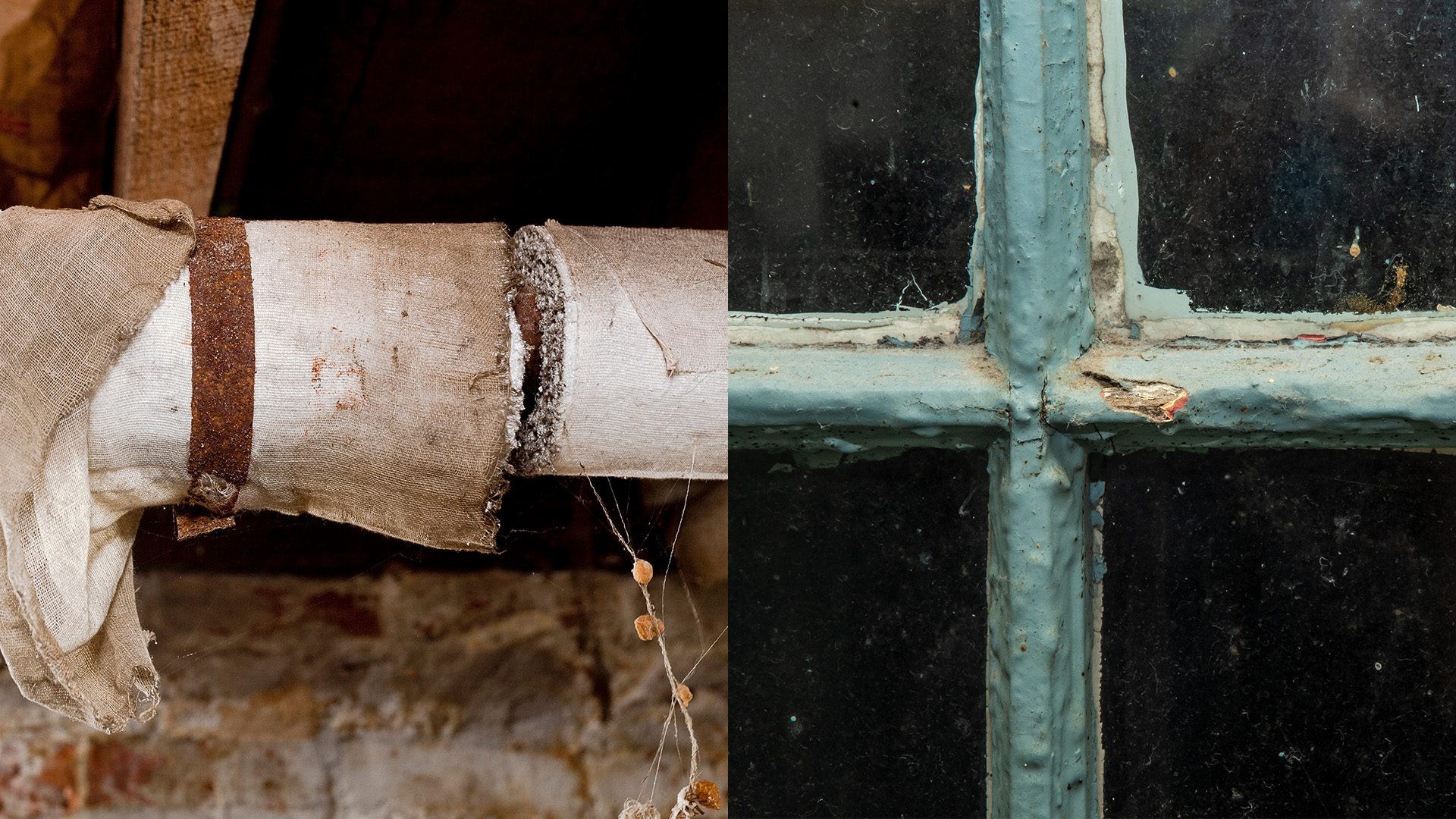
Asbestos and Lead Paint: Michigan’s Hidden Expenses
Pre-1980 housing stock throughout Metro Detroit likely contains asbestos or lead paint, requiring professional testing and potentially expensive remediation.
Asbestos testing costs $250-850, with removal running $5-20 per square foot for interior work. Michigan averages $1,123-$2,872 for typical asbestos abatement, but extensive projects reach $10,000-$20,000. Common locations include:
- Popcorn ceilings: $4-20 per square foot removal
- Vinyl flooring and mastic: $4-15 per square foot
- Pipe insulation: $5-15 per linear foot
- Vermiculite attic insulation: $4,125 ZAI Trust reimbursement available for Zonolite removal
Encapsulation at $2-6 per square foot provides cheaper alternatives when materials remain intact and won’t be disturbed. However, remodeling typically requires disturbing these materials, forcing proper removal by licensed contractors.
Lead paint testing runs $300-700, with removal costing $6-17 per square foot ($1,490-$5,600 typical, up to $20,000+ extensive projects). Michigan requires certified contractors for work disturbing more than 2 square feet interior or 20 square feet exterior in pre-1978 homes, with substantial fines for non-compliance. Federal EPA regulations mandate Lead-Safe Certified Renovators for similar thresholds.
These materials add weeks to timelines, require occupant relocation during abatement work, demand proper containment to prevent contamination spread, and necessitate disposal as hazardous waste at certified facilities – all adding costs your initial bathroom or kitchen estimate likely didn’t include.
Code Compliance Upgrades: The 10-25% Budget Addition
Pulling permits triggers code compliance requirements that can add 10-25% to your project budget even when your planned work seemed straightforward. Michigan code requires:
Electrical Upgrades:
- GFCI outlets in bathrooms and within six feet of kitchen water sources
- AFCI protection for bedroom circuits potentially including adjacent spaces
- Dedicated 20-amp circuits for bathrooms and kitchen small appliances
- Proper grounding extended to all new work
- Electrical panel upgrades from 100-amp to 200-amp service: $1,200-$3,000
- Comprehensive electrical updates: $600-$12,000 depending on extent
Plumbing Upgrades:
- Individual fixture shutoffs for easy maintenance
- Anti-scald devices on showers and tubs preventing burns
- Proper drain slope and venting per current codes
- Major plumbing updates: $1,500-$15,000
These aren’t optional upgrades you can negotiate away – building inspectors will require compliance before approving your work, and professional contractors won’t risk their licenses by skipping required code updates even if you’re willing to accept the risk.
The Essential 20% Contingency Budget
Industry consensus settles firmly on 10-20% contingency budgets for kitchen and bathroom remodeling projects, with conservative experts recommending 25% for older Michigan homes. This isn’t pessimism – it’s realism based on decades of contractor experience.
Adjust your contingency based on these factors:
- Simple cosmetic remodels in newer homes: 10-15%
- Mid-range kitchen and bathroom projects: 10-15%
- Major renovations with layout changes: 15-20%
- Older Michigan homes (pre-1950s): 15-25%
- Historic homes or properties with known issues: 20-30%
What does contingency cover? Unforeseen structural issues discovered during demolition, hidden damage behind walls requiring repairs, code upgrades triggered by permits, material price fluctuations during long projects, homeowner change orders when you decide to upgrade mid-project, and timeline extensions requiring contractors to remobilize.
The homeowners who struggle most? Those who budget to the penny based on initial estimates, leaving no room for inevitable surprises. When you discover rotted subfloor or corroded pipes, you’re either delaying the project to save additional money (extending timelines and sometimes increasing costs further), compromising on quality to stay within original budget, or stressing about finances throughout the remodeling project.
Smart homeowners budget conservatively from the start, then enjoy the pleasant surprise of finishing under budget or using savings for desired upgrades rather than mandatory repairs.
💳 Financing Your Kitchen or Bathroom Remodel
Understanding Your Financing Options in Michigan
Most homeowners don’t have $50,000-$75,000 sitting in savings accounts waiting for remodeling projects. Fortunately, multiple financing options help Metro Detroit residents fund kitchen and bathroom renovations, each with distinct advantages and considerations.
Home Equity Line of Credit (HELOC)
HELOCs offer the most flexible and often most affordable financing for remodeling. Michigan credit unions provide particularly competitive rates in 2024-2025:
- Michigan United Credit Union: Promotional rates as low as 1.99% APR through mid-2026, then adjusting to variable rates of 3.00-7.50% for well-qualified borrowers, up to $150,000 maximum with 90% loan-to-value availability
- Credit Union ONE: Up to $250,000 at rates from 3.25% minimum to 18% maximum based on creditworthiness
- National Average: 7.81% APR as of November 2025
HELOC advantages include only paying interest on amounts actually used, flexible draw periods letting you access funds as needed during construction, interest potentially tax-deductible when used for home improvements, and the lowest rates available for homeowners with equity. However, variable rates can increase over time, requiring second-position lien on your home, and demand good credit (typically 680+ scores) and significant equity (often 80% combined loan-to-value maximum).
Home Equity Loans
Fixed-rate home equity loans offer payment certainty, currently available at 7.49-7.88% APR through Michigan credit unions for borrowers with 680+ credit scores:
- Credit Union ONE: Rates as low as 7.878%
- Adventure Credit Union: 60-month terms at 7.49% APR with monthly payments of $20.03 per $1,000 borrowed
Fixed rates provide predictable monthly payments that won’t fluctuate with market conditions, making budgeting easier throughout your repayment period. You receive full loan amount upfront, useful for paying contractors who require deposits or staged payments. However, rates run slightly higher than HELOCs initially, you pay interest on the full amount from day one even if you don’t need all funds immediately, and closing costs typically run $500-$1,500.
Contractor Financing Programs
Many remodeling contractors partner with financing companies offering fast approvals and competitive promotional rates. Programs through providers like BuyFin, PowerPay, and Medallion Bank feature:
- Fast approvals within minutes, funding in 24-48 hours
- APRs ranging 7.99-35.99% depending on credit
- Promotional periods of 0% interest for 12-18 months on approved credit
- No home equity requirement or liens against property
This option works best for borrowers who can repay quickly during promotional periods, avoiding deferred interest charges that accrue if balances remain at promotional period end. However, rates after promotional periods typically exceed home equity options significantly, and some programs charge origination fees of 1-5%.
Personal Loans
Unsecured personal loans average 12.25-12.38% APR nationally, with rates varying significantly by credit:
- Excellent Credit (720+): 10.68-13.89% APR
- Good Credit (690-719): 15-20% APR
- Fair Credit (630-689): 28.37-31.78% APR
Personal loans offer the advantage of no home equity requirement and no liens against your property, with faster approval and funding than home equity products (often 1-3 days). However, significantly higher interest rates than home equity options, lower maximum loan amounts (typically $50,000 maximum), and shorter repayment terms (usually 2-7 years) creating higher monthly payments make these less attractive for larger projects.
Calculating What You Can Actually Afford
Creating a realistic budget starts with honest assessment of your financial capacity. Use the 28/36 rule as guideline: your total housing costs including mortgage, insurance, taxes, and new loan payment shouldn’t exceed 28% of gross monthly income, and total debt payments shouldn’t exceed 36%.
For a $50,000 kitchen remodel financed through various options:
- HELOC at 6% APR (10-year repayment): ~$555/month
- Home Equity Loan at 7.5% APR (10-year repayment): ~$594/month
- Personal Loan at 12% APR (5-year repayment): ~$1,112/month
Consider total interest costs over repayment periods. That $50,000 HELOC at 6% costs approximately $16,600 in interest over 10 years, while the personal loan at 12% for 5 years costs approximately $16,720 in interest despite half the repayment period. The home equity loan at 7.5% over 10 years costs approximately $21,280 in interest.
Factor in tax implications – home equity interest may be tax-deductible when used for home improvements, potentially saving 12-24% of interest costs depending on your tax bracket. Consult tax professionals about your specific situation.
🤝 Working with Contractors: Getting Accurate Estimates in SE Michigan
What Should Be Included in Professional Estimates
A detailed written estimate from your professional contractor should break down all costs clearly, allowing you to compare multiple quotes accurately and understand exactly what you’re paying for. Quality estimates include:
Project Scope Description:
- Specific work to be performed in detail
- Materials specified by brand, model, color
- Fixtures and appliances with exact specifications
- Demolition and disposal included
- What’s NOT included to prevent misunderstandings
Detailed Cost Breakdown:
- Labor costs separated by trade (carpentry, plumbing, electrical, tile)
- Material costs itemized by category
- Permit fees and inspection costs
- Disposal and dumpster fees
- Contingency allowances for unknowns
Timeline and Schedule:
- Estimated start date
- Projected completion date
- Major milestone dates
- Material lead times and ordering schedule
Payment Terms:
- Total project cost clearly stated
- Payment schedule tied to milestones
- Deposit amount (typically 10-30%, never more than 50%)
- How change orders will be handled and priced
Warranty Information:
- Workmanship warranty duration and coverage
- Material warranties from manufacturers
- Process for addressing issues after completion
Beware of estimates that provide only a single total number without itemization, use vague language like “high-quality materials” without specifications, require large upfront deposits before work begins, or pressure you to sign immediately with “special pricing that expires today.”
Questions to Ask Metro Detroit Contractors
During your consultation with potential contractors, ask these essential questions to evaluate their qualifications and approach:
Licensing and Insurance:
- “Are you licensed in Michigan for this type of work?”
- “Can you provide proof of current liability insurance?”
- “Do you carry workers’ compensation insurance for your employees?”
- “Who pulls permits – you or me – and are permit costs included in your estimate?”
Experience and Expertise:
- “How long have you been doing kitchen/bathroom remodeling specifically?”
- “How many projects like mine have you completed in the past year?”
- “Can you provide references from recent projects in Metro Detroit?”
- “What’s your experience with homes from [your home’s era]?”
Project Approach:
- “What’s included in your labor costs – just installation or also plumbing/electrical?”
- “How do you handle unexpected issues discovered during demolition?”
- “What’s your process for change orders and how are they priced?”
- “What warranties do you offer on workmanship?”
- “How do you protect against cost overruns?”
Communication and Process:
- “Who will be my main point of contact during the project?”
- “How often will you update me on progress?”
- “Do you use subcontractors, and if so, how do you ensure their quality?”
- “What’s your typical timeline for a project like this?”
- “How do you handle site cleanup daily and at project completion?”
The right contractor answers these questions confidently with specific details, provides documentation without hesitation, and makes you feel comfortable with their approach. Red flags include vague answers, reluctance to provide references, pressure to decide immediately, or inability to explain their process clearly.
Why Leach Construction Approaches Pricing Differently
At Leach Construction, we’ve served Southeast Michigan homeowners since 1965, giving us deep understanding of Metro Detroit’s unique challenges – from older housing stock requiring careful planning to Michigan building codes that affect every project. Our approach to pricing reflects this experience:
Transparent, Detailed Estimates: We provide complete breakdowns showing exactly where your money goes, from materials to labor to permits. No vague “allowances” or hidden costs surprise you mid-project.
Upfront Problem Identification: Our detailed inspection process before providing estimates helps identify potential issues – outdated wiring, old plumbing, structural concerns – so we can factor contingencies appropriately rather than surprising you with change orders later.
Clear Communication Throughout: From initial consultation through final walkthrough, we keep you informed about progress, any issues discovered, and timeline updates. You’re never wondering what’s happening with your project.
60+ Years Local Expertise: Our three generations serving Wayne, Oakland, Macomb, St. Clair, and Washtenaw counties means we understand Michigan’s specific requirements, from permit processes to code compliance to seasonal considerations affecting construction.
We guarantee that the price we quote is the price you pay, barring disclosed structural contingencies we identify during our initial assessment. Our goal isn’t just completing your kitchen or bathroom remodel – it’s earning your trust for future projects and referrals to your neighbors and friends.
📅 Planning Your 2026 Kitchen or Bathroom Remodel
Creating Your Realistic Remodeling Timeline
Understanding realistic timelines helps you plan appropriately and avoid frustration from unmet expectations. Kitchen and bathroom projects involve multiple phases, each requiring specific durations:
Kitchen Remodel Timeline
Total Project Duration: 3-6 months from initial consultation to completion
Phase Breakdown:
- Planning and Design: 2-8 weeks – Initial consultations, measurements, design development, material selection
- Permitting: 1-4 weeks – Permit application, review, approval (longer during peak season)
- Material Ordering and Delivery: 3-16 weeks depending on selections:
- Stock cabinets: 3+ weeks minimum
- Semi-custom cabinets: 6 weeks average
- Custom cabinets: 8-16 weeks (2025 lead times up 10-15% versus 2023)
- Construction Phase: 4-8 weeks for mid-range projects:
- Demolition: 1-2 days
- Rough-in electrical, plumbing, HVAC: 1-3 weeks with inspections
- Drywall and finishing: 1 week
- Cabinet installation: 3-5 days to 1 week
- Countertop templating and installation: 2-3 weeks after cabinets
- Flooring: 2-4 days
- Appliance installation: 1-2 days
- Final touches (paint, trim, fixtures): 2-4 weeks
Small cosmetic kitchen updates finish in 1-3 weeks, while major remodels requiring structural changes extend 8-14 weeks. Detroit-specific projects may add 15% to timelines due to urban logistics, parking limitations, and older housing complications.
Bathroom Remodel Timeline
Total Project Duration: 6-12 weeks from planning through completion
Construction Phase: 3-5 weeks typical for full bathrooms (4-6 weeks average)
Phase Breakdown:
- Demolition: 1 day (up to 1 week for extensive projects)
- Plumbing and Electrical Rough-in: 1-2 weeks with inspections
- Waterproofing and Wall Prep: 2-3 days
- Tile Work: 1-2 weeks depending on complexity and drying time
- Drywall Finishing: 3-5 days
- Fixture Installation: 3-5 days
- Final Finishes: 1-2 weeks for paint, trim, accessories
Small cosmetic bathroom updates finish in 1-2 weeks, while complex primary bathrooms with layout changes extend 6-10 weeks. Single-bathroom homes face urgency pressure, requiring careful coordination to minimize disruption.
Best Times to Start Remodeling in Michigan
Seasonal factors dramatically influence Michigan remodeling success, affecting both pricing and timelines:
❄️ Winter (December-February):
- Best For: Indoor kitchen and bathroom work, budget-conscious projects
- Advantages: 15-20% potential discounts, best contractor availability, no competition for scheduling
- Challenges: Material delivery risks from snow and ice, potential weather delays, holiday disruptions
- Ideal Strategy: Book during winter for spring completion when weather improves
🪻 Spring (March-May):
- Best For: All project types, most popular season
- Advantages: Mild weather, stable availability, reasonable pricing
- Challenges: Increasing demand requires 3-4 months advance booking
- Recommended Approach: Book in December-January for spring start
☀️ Summer (June-August):
- Best For: Projects requiring exterior access or when school’s out
- Advantages: Extended daylight hours, fastest completion, stable weather
- Challenges: Peak demand requiring 6+ months advance booking, highest costs, vacation conflicts
- Timeline Impact: Extended hours can reduce overall project duration 15-20%
🍂 Fall (September-October):
- Best For: All project types, optimal balance
- Advantages: Comfortable weather, declining demand improving availability, competitive pricing
- Challenges: Limited window before winter weather arrives
- Strategic Timing: Start early fall to complete before holidays
Smart Metro Detroit homeowners plan 6-9 months ahead, booking quality contractors during slower periods while securing better rates and prime scheduling slots.
✅ Frequently Asked Questions About Kitchen and Bathroom Remodeling Costs
What is the average cost to remodel a kitchen in Michigan in 2026?
The average kitchen remodel cost in Southeast Michigan ranges $35,000-$75,000 for full mid-range renovations of 100-200 square foot kitchens. Small kitchen updates under 100 square feet typically cost $15,000-$35,000, while luxury remodels exceed $75,000 and can reach $150,000+ for high-end materials and extensive layout changes. These ranges reflect complete projects including cabinets, countertops, appliances, flooring, lighting, labor, and permits specific to Metro Detroit pricing.
How much does a bathroom renovation cost in St. Clair Shores and Metro Detroit?
Standard full bathroom renovations in St. Clair Shores and surrounding Metro Detroit communities cost $18,000-$35,000 for 50-100 square foot spaces. Small guest bathrooms under 50 square feet run $8,000-$18,000, while primary bathroom remodels range $35,000-$75,000+ including luxury features like separate shower and soaking tub, double vanities, and premium tile work. Costs vary based on fixture quality, tile complexity, and whether you’re maintaining existing layout or making structural changes.
Do I need a permit for a kitchen remodel in Metro Detroit?
Yes, you need permits for kitchen remodels involving electrical work, plumbing modifications, structural changes, or HVAC alterations in all Metro Detroit municipalities. Permit costs range $200-$1,000 depending on your specific location and project scope, with processing taking 1-4 weeks (longer during peak construction season). You don’t need permits for cosmetic updates like cabinet replacement, countertop installation, or painting that don’t affect underlying systems. Working without required permits risks fines, forced work removal, and complications during home sales.
How long does a Michigan bathroom renovation take?
Full bathroom renovations in Michigan typically take 3-5 weeks for construction phase, with total project timelines of 6-12 weeks including planning, material ordering, and permitting. Small cosmetic updates finish in 1-2 weeks, while complex primary bathrooms with layout changes extend 6-10 weeks. Factors affecting timeline include custom material lead times (order 6-9 months ahead), contractor availability (book 6+ months advance for peak season), permit processing (1-4 weeks), and seasonal weather considerations affecting material delivery and inspection scheduling.
What’s the ROI on kitchen and bathroom remodels in SE Michigan?
Kitchen and bathroom remodels deliver solid returns in Southeast Michigan, with minor kitchen remodels recouping 72-96% of costs and midrange bathroom remodels returning 66.7-80% according to Cost vs. Value Report data. Metro Detroit markets often outperform national averages for practical, mid-range projects. However, major kitchen remodels return just 37.5-53% due to higher initial investments that buyers don’t fully value. The key to maximizing ROI involves focusing on mid-range materials, maintaining functional layouts, and avoiding over-improving beyond your neighborhood’s standards.
Can I remodel my kitchen and bathroom at the same time?
Yes, combining kitchen and bathroom remodel together can save 10-15% on total costs through consolidated contractor mobilization, volume material discounts, and reduced permit/inspection fees. A combined $50,000-$80,000 project could save $5,000-$12,000 versus tackling spaces separately. The main challenge involves living through more extensive disruption with reduced functionality in two critical spaces simultaneously. This approach works best for homeowners with flexible living situations or those renovating before moving in, spreading the temporary inconvenience across fewer total weeks than sequential projects.
What costs more: kitchen or bathroom remodel?
Kitchens typically cost more than bathrooms due to larger square footage, more extensive cabinetry requirements, and expensive appliances. A full mid-range kitchen remodel averages $35,000-$75,000 versus $18,000-$35,000 for comparable bathroom work. However, bathroom projects often involve higher labor costs as percentage of total budget (40-65% versus 20-35% for kitchens) due to specialized tile work and complex plumbing. The most cost-effective approach depends on your specific needs, current condition of each space, and which improvements deliver better functionality and resale value for your situation.
🏡 Ready to Start Your Kitchen or Bathroom Remodel?
Understanding costs is just the first step. The real value comes from working with experienced professionals who help you make strategic decisions that balance your budget, lifestyle needs, and long-term home value.
At Leach Construction, we’ve been helping Southeast Michigan homeowners navigate kitchen and bathroom remodeling projects since 1965. Our three generations of experience mean we understand the unique challenges of Metro Detroit homes – from older housing stock requiring careful planning to Michigan building codes that affect every project.
We provide:
- Free Consultations: Detailed assessment of your space with honest recommendations about what makes sense for your situation and budget
- Transparent Pricing: Complete cost breakdowns showing exactly where your money goes, with realistic contingencies based on your home’s specific conditions
- Local Expertise: Deep knowledge of Wayne, Oakland, Macomb, St. Clair, and Washtenaw county requirements, from permit processes to seasonal considerations
- Quality Workmanship: Professional installation with attention to details that ensure your remodel lasts for decades
- Clear Communication: Regular updates throughout your project so you’re never wondering what’s happening or when work will complete
Whether you’re planning a budget-friendly refresh or a luxury renovation, we’ll help you create a realistic budget, select appropriate materials, and develop a timeline that works for your life. No pressure, no gimmicks – just honest guidance from contractors who’ve seen every scenario Metro Detroit homes can present.
Contact Leach Construction today for your free consultation. Let’s discuss your kitchen or bathroom remodeling project and create a plan that delivers the space you’ve been dreaming about at a price that fits your budget.
Serving homeowners throughout Southeast Michigan: Wayne County, Oakland County, Macomb County, St. Clair County, and Washtenaw County. Licensed, insured, and proud to be your neighbors since 1965.

